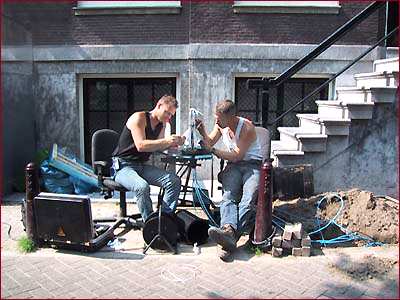| The Art of Survival (1) |

| The Amsterdam IT industry are a resilient lot. Been evicted from your offices? No problem - we'll keep plugging away until the tide has turned. All we have to do is dig a hole, tap into the mains and hook up to a fibre optic cable, and Bob's your uncle! |
|
I go through periods of dining out a lot. During such periods my eagerness
to sample fresh experiences gradually but inexorably evaporates and I start
wondering what will go wrong next, which dish will taste unspeakably awful,
whether the wine will justify its price tag, how the staff will deal with
lengthy delays, and so on.
The reason for mentioning this is my discovery, two years ago, of a glorious wine for a reasonable price, which I proceeded to stock up on to such extent as to spark trepidations that I would prove unable to drink it sufficiently fast as to pre-empt the ageing process - not my own but the wine's, I hasten to add. This is where a brief digression is in order. One of the idiosyncrasies of the average red-blooded American male is his ability regardless of the circumstances to bring up a phenomenon which is taller, longer, thicker, heavier, thinner or costlier than anything else in the whole wide world. Dutch females, by contrast, prefer the sensation of having purchased something at the largest possible discount. My wine ranks somewhere in between these two extremes. But this is of minor significance. The crux of the matter is that in much the same way as one would vet an artist who has been dead for a long time against his or her best work - something which should not be mistaken for the correct view that a suspect may not be treated as being guilty until he or she has been proven to be guilty - we have to wonder whether we appreciate that savouring the positive - in terms of chances of survival - is of considerably greater importance than what communis opinio considers to be right. In other words, I would most emphatically stress that I much prefer remembering several of my recent restaurant visits by the things that were good or even excellent, albeit without denying myself the pleasure of graphically bringing the fiascos to your attention. What I mean by this is that this acts as something of a double-edged sword even to those whose very nature makes it impossible for them to express even the most fleeting hint of forgiveness: something is good and something else is bad, and both are a source of potential gratification. And yet the restaurant whose amuse consisted of a genuine oyster has continued to upset me to this very day. I abhor oysters. I see a need for culinary critics with a dislike for oyster-like products and other foods of the slimy, jellylike, slippery, leathery variety. I also see a complementary need for arrangements whereby one is dropped in a hostile coastal area with the task of surviving for a week on what the sea has to offer: fruits de mer and not a plate or casserole in sight, to be consumed uncooked, with one's bare hands. It must be paradise for those who like that sort of thing. And yet, If I were to wash up unannounced I'd join in, for that's the sort of sterling stuff I'm made of, although not as a paying customer. Back to the restaurant, where no alternative amuse was at hand. This I would qualify as arrogant: as if one doesn't count if one happens to dislike oysters. I'm not even holding it against you that oysters are served and consumed while still very much alive. And it's not that I suffer from anxiety where it concerns culinary notions, either: the main course consisted of a splendid cut of veal - I recall us cracking a few jokes about BSE and FMD - topped, as announced in the menu, by pâté-like sweet-tasting goose-liver coils with a crispy core. These coils too evoked a feeling of disgust in me, quite unfoundedly I should add as I had only myself to blame for picking this particular dish, and risk is something one has to take into the bargain. And yet I remember the evening at the restaurant as most successful, in spite of the amuse and the coil-covered main course, for the wine was excellent: modest, slightly cheeky, a touch poetic and with a hint of dry garden soil, yet sultry at the same time, like a bra strap which has inadvertently slipped down a bare shoulder. I never feel bold enough at a restaurant to inquire where they purchase their wines, for that would expose the surcharge factor they apply. This unmistakably qualifies as embarrassment by proxy on my part, for I have enjoyed wonderful food and drink in Paris, New York and Tokyo, and yet the most delicious wines have frequently been most refreshingly reasonably priced. Which calls for gratitude for Dutch price levels for that extra bit of enjoyment they confer. |